The General Assembly Acts for Justice and Liberation in Palestine and Israel
“Let justice roll down like waters, and righteousness like an ever-flowing stream.” -Amos 5:24

The 222nd General Assembly PC(USA) took place from June 17-25, 2016, in Portland, Oregon. I was fortunate enough to attend and serve as a Ruling Elder Commissioner for National Capital Presbytery. One of the overarching themes of the entire work of the assembly was a reflection of the Belhar Confession. In Reformed or Presbyterian terms, a confession is a formal statement of faith, in this case named for its city of origin in South Africa. It was written in 1986, during the apartheid era. The proposal for adopting the Belhar Confession for the PC(USA) had worked its way through an ongoing process over the past two General Assemblies, and it was the Ecumenical and Interfaith Relations Committee (7) that brought it forth to the plenary for a formal vote. It was overwhelmingly supported as a new confession for the PC(USA), emphasizing justice in all aspects of its work.
The incredible spirit of the Belhar Confession was “in the room” in nearly every plenary session in some form or other. It was particularly present during the review by the Bills and Overtures Committee, which I was assigned to monitor. That same spirit was also present in the Middle East Issues Committee (8) and the Peacemaking and International Issues Committee (12) as the members struggled to hear God’s Word to them. As I reviewed the results of the work of these committees, both of which I had personal experience and interest in, I saw a powerful connection between the call of the Belhar Confession and the work carried out by those committees.
___________________________________________
The incredible spirit of the Belhar Confession was “in the room” in nearly every plenary session in some form or other.
___________________________________________
The Bills and Overtures Committee assigns and schedules the work of all General Assembly committees, so the resolutions from (8) and (12) were placed in the docket in order of importance and introduced to the plenary in that order. It is important to examine the vote count not only in the plenary but in the committees charged to do the work, on written amendments created through debate and on comments added to the approved resolutions. The following items of business were passed in committee:
Middle East Issues Committee (8)
8.02 – “Advocating for the Safety and Well Being of Children of Palestine” was approved as amended by an overwhelming vote of 67-10 in committee and 464-95 in the plenary. While modifications were made during the committee work to include children of Israel as well, there were no major objections to the heart of this overture.

Photo Credit: Erin Dunigan
The 8.02 resolution, which passed as amended, called for both governments “to denounce and cease the incitement of violence against children, or at the hands of children.” A reflection of such actions is stated in the Belhar Confession: “God, in a world of injustice and enmity, is in a special way the God of the destitute, the poor and the hungry.” As it currently stands, Palestinian children often find themselves among “the destitute, the poor and the hungry.”
8.06 – “Israel/Palestine: For Human Values in the Absence of a Just Peace” calls for the church to look deeply into a values- and rights-based approach rather than solely a one- or two-state solution approach. The committee approved the motion with comment 58-18, and even though there was a minority report submitted in the plenary it was defeated by a margin of 483-72. The main motion from committee was thus approved, with two amendments added to the comment during plenary. (The Assembly added to the comment words re-affirming a preference for a two-state solution, but comments do not have the standing of policy recommendations, which were unchanged, indicating that such a solution may in fact no longer be feasible given the growth of Israeli settlements, the separation wall, and denials of rights.)
In the words of Belhar: “God supports the downtrodden, protects the stranger, helps the orphans and widows and blocks the path of the ungodly.” I myself read from Belhar on the plenary floor during this debate.
___________________________________________
It was the moment when we adopted the Belhar Confession and, hand in hand, rose to sing “We Shall Overcome” that brought tears to my eyes.
___________________________________________
8.07 – “On Prayerfully Studying the Palestinian Civil Society Call for Boycott, Divestment, and Sanctions (BDS) against the State of Israel” was approved as amended by a vote of 67-8 in committee and 407-146 in plenary. The study will engage, as dialogue partners, the authors and signatories of that call as well as interfaith partners who oppose BDS. The study team may find Belhar’s reminder “…that God wishes to teach the Church to do what is good and to seek the right” to be a guiding light in their work together.

Photo by Noushin Framke
8-04 – “On Calling for the RE/MAX Corporation to Cease Selling Property in West Bank Settlements” This overture, calling on the RE/MAX Corporation to do everything within its moral and legal power to stop the sale and rental of properties in the illegal settlements and commending RE/MAX for its positive engagement thus far, passed by a vote of 71-5 in committee and by common consent in plenary. The amendments also called for continued dialogue with the company; in doing so, we might seek to be “more obedient in seeking what is ‘good and right,’” as called for by the Belhar.
8.01 – “On Boycott of all HP Inc. and Hewlett Packard Enterprise Products” was defeated in committee 51-25 and in plenary 483-72. This measure would have called for a boycott of all products manufactured and sold by the two companies. The GA had already approved an overture calling for divestment from HP in 2014. The main objection was not to the very telling information in the overture, but that it would mean that all firms divested from or kept out of our portfolios (there are over 20 nuclear weapons and military contractors, for example) would then also be liable to boycott campaigns.
Peacemaking and International Issues Committee (12)
12.05 – “Affirming Nonviolent Means of Resistance Against Human Oppression” acknowledges that boycott, divestment, and sanctions have historically been used by the PC(USA) as tools of nonviolent resistance (dating back to 1910!) and calls on the church to create resources focused on the theology of peacemaking and nonviolence related to boycott, divestment, and sanctions. This action passed by voice vote. Perhaps the wishes of the Assembly are reflected in these words of the Belhar Confession: “that God has revealed himself as the one who wishes to bring about justice and true peace among people.”
***
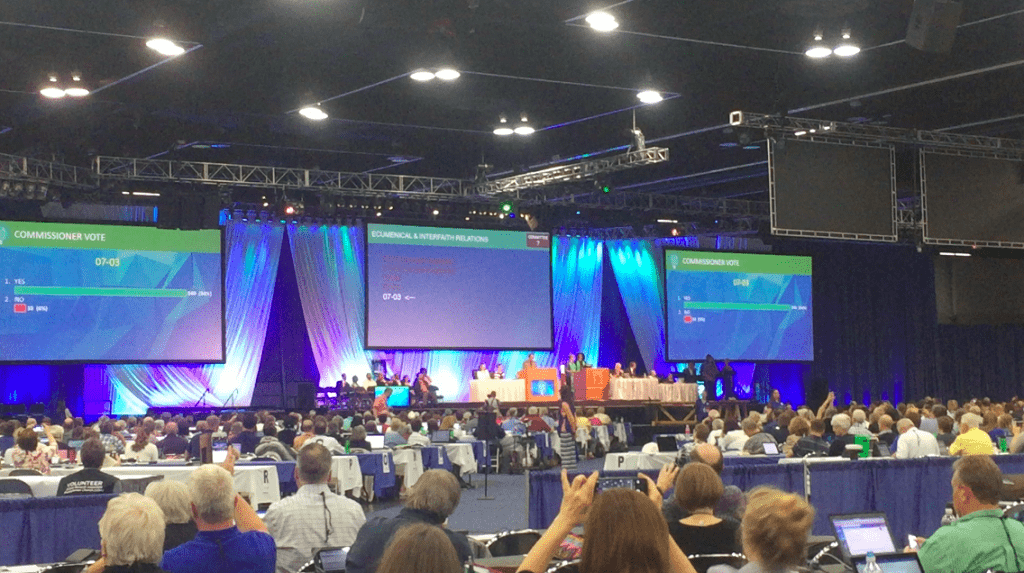
Photo: Ginna Bairby
The Belhar Confession appeals to those who confess it: “the church as the possession of God must stand where the Lord stands, namely against injustice and with the wronged; that in following Christ the church must witness against all the powerful and privileged who selfishly seek their own interests and thus control and harm others.”
With that in mind, serving as a Ruling Elder commissioner to the 222nd General Assembly of the PC(USA) will abide in my heart for the remainder of my life as a moment of dedication to that appeal. Sitting together with over 700 fellow commissioners and advisory delegates during the installation of our two female co-moderators and, for the first time, the installation of an African American Stated Clerk, were undoubtedly stirring moments.
However, it was the moment when we adopted the Belhar Confession and, hand in hand, rose to sing “We Shall Overcome” that brought tears to my eyes. In the spirit of unity and the work of justice, I will never be the same. May it be so for all who believe.
*****
AUTHOR BIO: Bill Plitt is a ruling elder at Trinity Presbyterian Church in Arlington, VA, and former vice moderator of the Israel/Palestine Mission network (PCUSA). He is executive director and co-founder of the Friends of Tent of Nations North America. He is the vice-moderator of National Capital Presbytery, and a ruling elder commissioner to the 222nd General Assembly.


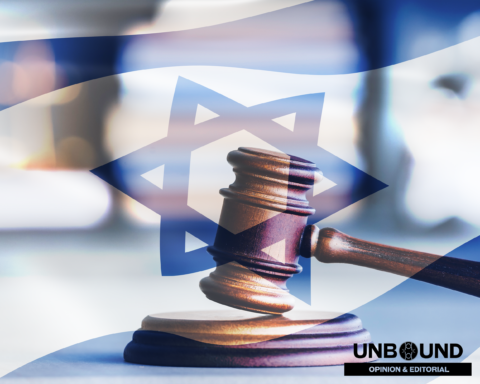
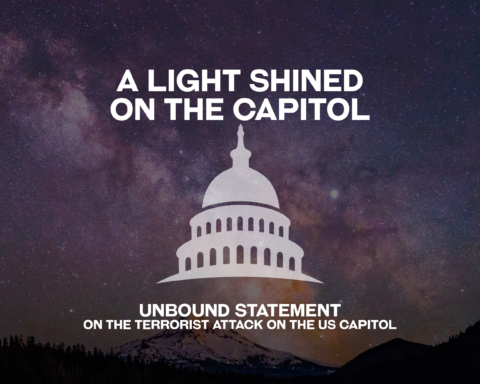
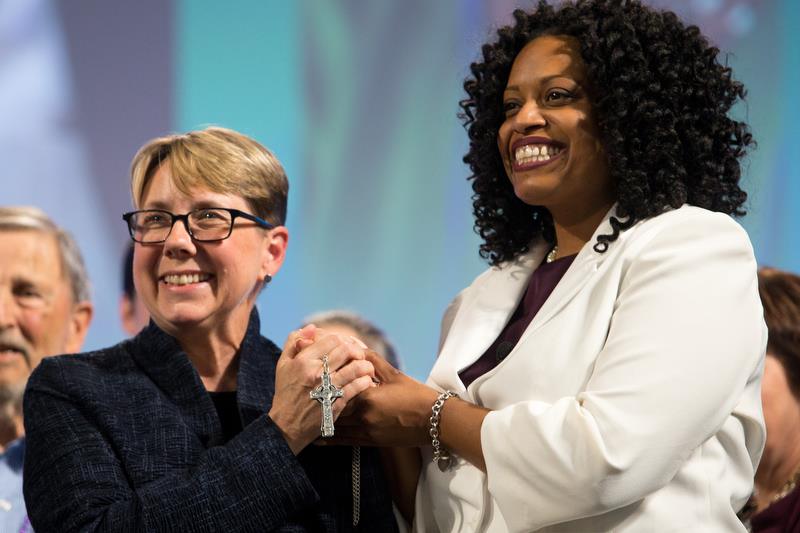
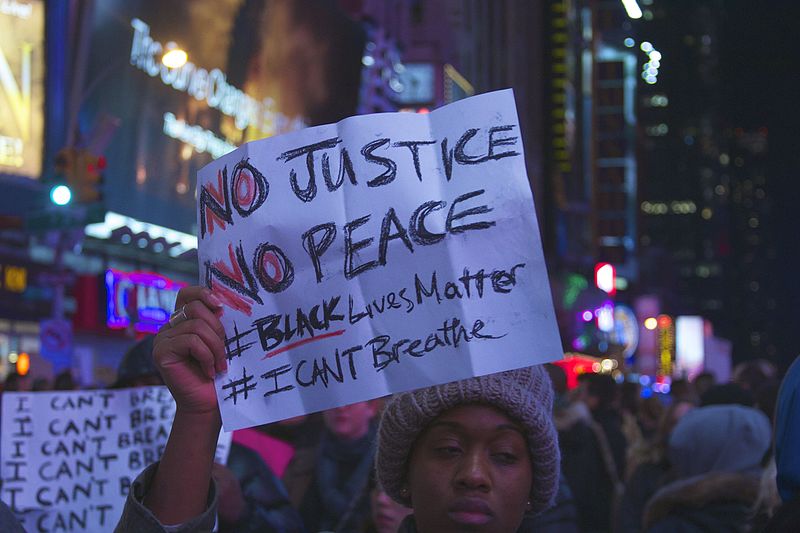
Unbound Social